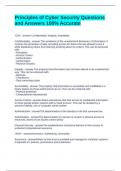Exam (elaborations)
Principles of Cyber Security Questions and Answers 100% Accurate
- Course
- Institution
Principles of Cyber Security Questions and Answers 100% Accurate CIA Confidentiality, Integrity, Availability Confidentiality The avoidance of the unauthorized disclosure of information. It involves the protection of data, providing access for those who are allowed to see it while disallo...
[Show more]



